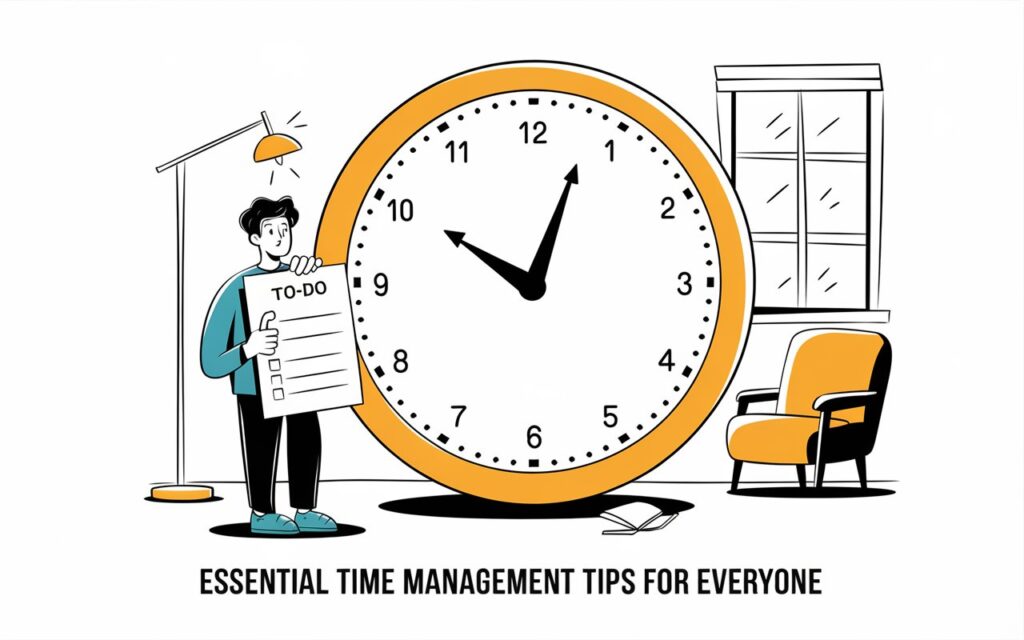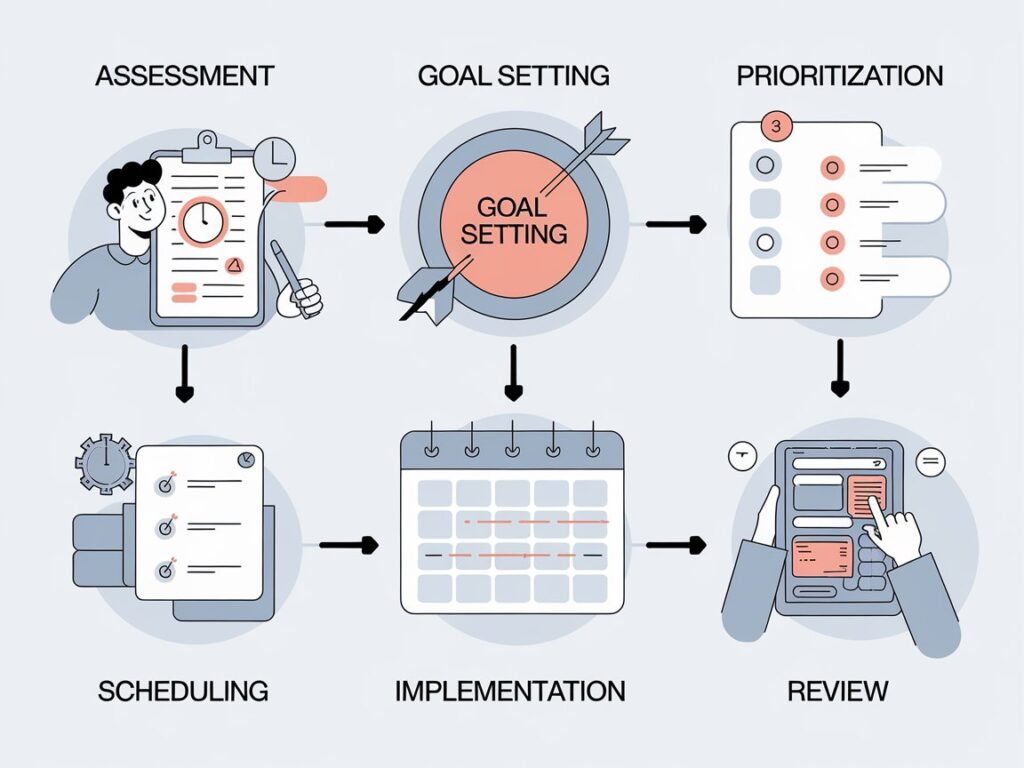Time is something we all wish we had more of, right? Whether it’s squeezing in that extra project at work, spending more time with loved ones, or simply finding a moment to relax, effective time management can make all the difference.
But what exactly is time management, and why is it so important?
Let’s dive in and discover the essential tips to help you make the most of your time.
What is time management?
Time management is the process of planning and controlling how much time to spend on specific activities. It involves organizing your schedule so that you can complete tasks efficiently and effectively.
Managing your time well means you can get more done in less time, which often leads to increased productivity and a better work-life balance.
Imagine having a day where you feel in control, where your tasks are lined up in a way that allows you to move smoothly from one to the next without feeling overwhelmed.
That’s the magic of good time management. It’s not about squeezing as much work as possible into your day, but about making sure the important things get done, and that you also have time left over for the things you enjoy.
Time management is a skill that can be learned and improved upon. Like any skill, the more you practice, the better you get.
Whether you’re a student trying to balance school and a part-time job, a parent juggling work and family responsibilities, or a professional looking to advance in your career, learning how to manage your time effectively can make a significant difference in your life.

Why is time management important?
Time management is important because it helps you make the most of your day. We all have the same 24 hours, but how you use them can set you apart.
With proper time management, you can reduce stress, increase productivity, and feel more in control of your life.
When you manage your time well, you’re less likely to feel rushed or overwhelmed. You can plan ahead, anticipate challenges, and tackle them before they become major problems.
This proactive approach not only reduces stress but also allows you to achieve your goals more easily.
Good time management also allows you to focus on what matters most. By prioritizing your tasks, you can ensure that you’re spending your time on activities that align with your values and goals.
This leads to a more fulfilling and balanced life, where you’re not just working for the sake of it, but working towards something meaningful.
Furthermore, effective time management can improve your quality of life. When you’re able to complete your tasks efficiently, you have more time to relax, pursue hobbies, and spend with loved ones.
This balance is essential for maintaining your well-being and preventing burnout.

Expert advice on how to better manage your time
If you’re ready to take control of your time, here are some expert tips to help you manage your time better.
These tips are simple yet effective, and by implementing them into your daily routine, you’ll start to see a positive change in how you manage your time.
1. Know how you’re spending your time
The first step in improving your time management is understanding how you’re currently spending your time.
Track your activities for a few days, noting down everything you do and how long it takes. This will give you a clear picture of where your time is going.
You might be surprised to find that you’re spending more time than you realize on certain activities, like scrolling through social media or watching TV.
Once you have a clear understanding of where your time is going, you can start to make adjustments and focus on the activities that are most important to you.
Tracking your time also helps you identify any patterns or habits that might be holding you back. For example, you might notice that you tend to procrastinate on certain tasks or that you’re more productive at certain times of the day.
By identifying these patterns, you can make changes that will help you manage your time more effectively.

2. Stick to a daily schedule
Creating a daily schedule is a powerful tool for managing your time. By planning out your day in advance, you can ensure that you’re using your time effectively and that you’re making progress towards your goals.
Start by writing down all the tasks you need to complete for the day, and then arrange them in order of priority.
Make sure to include time for breaks and other activities, such as exercise or spending time with family. Having a schedule helps you stay on track and prevents you from getting sidetracked by less important tasks.
Sticking to a daily schedule also helps you establish a routine, which can make it easier to manage your time in the long run.
When you have a routine, you know what to expect each day, and you can plan your time accordingly. This can reduce stress and help you feel more in control of your day.
3. Prioritize
Not all tasks are created equal, and some are more important than others. That’s where prioritization comes in. By identifying the most important tasks and focusing on them first, you can ensure that you’re spending your time on the activities that matter most.
Start by making a list of all the tasks you need to complete, and then rank them in order of importance. Focus on the top three tasks first, and then move on to the less important ones.
This way, you’ll make sure that you’re spending your time on the tasks that will have the biggest impact.
Prioritization also helps you avoid wasting time on tasks that aren’t important. When you know what your priorities are, you can make better decisions about how to spend your time.
This can help you stay focused and avoid getting sidetracked by less important tasks.
4. Automate repetitive tasks
One of the best ways to save time is to automate repetitive tasks. There are many tools and apps available that can help you automate tasks like sending emails, scheduling appointments, and managing your finances.
By automating these tasks, you can free up time for more important activities. For example, instead of spending hours each week sending out the same emails, you can use an email automation tool to do it for you.
This allows you to focus on more important tasks and reduces the risk of errors.
Automation also helps you stay organized and reduces stress. When you automate repetitive tasks, you can be sure that they’re being completed correctly and on time, without having to constantly check on them.
This gives you peace of mind and allows you to focus on the tasks that matter most.
5. Tackle the most difficult task first
It’s tempting to start with the easy tasks and save the difficult ones for later, but this approach can actually waste more time in the long run. By tackling the most difficult task first, you can get it out of the way and free up time for the rest of your day.
Starting with the most difficult task also helps you build momentum. Once you’ve completed the hardest task, the rest of your day will feel easier by comparison. This can help you stay motivated and make it easier to complete the rest of your tasks.
Tackling the most difficult task first also helps you avoid procrastination. When you start with the easy tasks, it’s easy to put off the harder ones until later, which can lead to stress and missed deadlines.
By tackling the most difficult task first, you can ensure that it gets done and that you have time for the rest of your day.
6. Batch-process similar tasks
Another great way to save time is to batch-process similar tasks. This means grouping together tasks that are similar and completing them all at once.
For example, if you have several emails to send, you can group them together and send them all at once. This way, you’re not switching between different tasks, which can save you time and help you stay focused.
Batch-processing also helps you stay organized and reduces stress. When you’re able to complete similar tasks all at once, you can be sure that they’re all being completed correctly and on time.
This gives you peace of mind and allows you to focus on the tasks that matter most.
7. Put AI to work for search and summaries
Artificial intelligence (AI) can be a powerful tool for saving time. There are many AI tools available that can help you search for information, summarize documents, and even write reports.
By using AI to automate these tasks, you can free up time for more important activities.
For example, instead of spending hours searching for information, you can use an AI tool to do it for you. This allows you to focus on more important tasks and reduces the risk of errors.
AI also helps you stay organized and reduces stress. When you use AI to automate tasks, you can be sure that they’re being completed correctly and on time, without having to constantly check on them.
This gives you peace of mind and allows you to focus on the tasks that matter most.

8. Set reasonable time limits
One of the keys to effective time management is setting reasonable time limits for your tasks. By giving yourself a specific amount of time to complete a task, you can stay focused and avoid wasting time.
Setting time limits also helps you stay organized and reduces stress. When you know how much time you have to complete a task, you can plan your time accordingly and avoid feeling rushed or overwhelmed.
Time limits also help you stay motivated. When you have a specific amount of time to complete a task, you’re more likely to stay focused and avoid distractions. This can help you complete your tasks more quickly and efficiently.
9. Learn when to say no
One of the most important skills in time management is learning when to say no. It’s easy to take on too much and end up feeling overwhelmed, but by learning to say no, you can protect your time and focus on what’s most important.
Saying no doesn’t mean you’re being difficult or unhelpful. It simply means that you’re prioritizing your time and energy.
By saying no to tasks that aren’t important or don’t align with your goals, you can free up time for the activities that matter most.
Learning to say no also helps you set boundaries and reduce stress. When you’re able to say no to tasks that don’t align with your goals, you can avoid feeling overwhelmed and focus on the activities that matter most.
10. Avoid multitasking
Multitasking might seem like a great way to get more done, but it can actually be counterproductive. When you try to do too many things at once, you’re more likely to make mistakes and waste time.
Instead of multitasking, focus on one task at a time. This allows you to give your full attention to the task at hand and complete it more quickly and efficiently.
Avoiding multitasking also helps you stay organized and reduces stress. When you focus on one task at a time, you’re less likely to feel overwhelmed and more likely to stay focused and productive.
11. Keep things organized
Staying organized is key to effective time management. When you’re organized, you can find what you need quickly and easily, which can save you time and reduce stress.
Start by organizing your workspace. Make sure everything has a place and that you can easily find what you need.
This will help you stay focused and avoid wasting time looking for things.
Keeping things organized also helps you stay on top of your tasks. When you’re organized, you can easily see what needs to be done and when. This can help you stay on track and avoid feeling overwhelmed.
Best Tips Of Our Daily Life Hacks.

Master time management to boost productivity
Mastering time management is a powerful way to boost your productivity. When you manage your time well, you can get more done in less time, which can lead to increased success in both your personal and professional life.
By following the tips in this guide, you can start to take control of your time and make the most of each day.
Whether you’re looking to get ahead at work, spend more time with loved ones, or simply have more time to relax, effective time management can help you achieve your goals.
Remember, time management is a skill that can be learned and improved upon. The more you practice, the better you’ll get.
Start by implementing one or two of these tips into your daily routine, and then gradually add more as you become more comfortable with managing your time.
As you continue to improve your time management skills, you’ll find that you have more time for the things that matter most to you.
This can lead to a more fulfilling and balanced life, where you’re not just working for the sake of it, but working towards something meaningful.

How to create your own time management strategy
Creating your own time management strategy is all about finding what works best for you. Everyone’s time management needs are different, so it’s important to tailor your approach to your specific goals and challenges.
Here’s how you can create your own time management strategy:
| Steps to Create Your Strategy | Description |
| 1. Assess your current time usage | Start by tracking your time for a week to see where it’s going. |
| 2. Set clear goals | Define what you want to achieve with better time management. |
| 3. Prioritize tasks | Identify the most important tasks and focus on them first. |
| 4. Create a schedule | Plan your day around your priorities, allowing time for breaks. |
| 5. Implement time-saving tools | Use tools like automation and AI to save time on repetitive tasks. |
| 6. Evaluate and adjust | Regularly review your strategy and make adjustments as needed. |
By following these steps, you can create a time management strategy that works for you. Remember, the key is to be flexible and willing to make adjustments as needed. With a little practice, you’ll be able to manage your time more effectively and achieve your goals.
Personal Story
I used to struggle with managing my time. I’d often find myself overwhelmed by the number of tasks on my to-do list, and I’d end up procrastinating and feeling stressed.
But once I started implementing some of these time management tips, things began to change.
I began by tracking how I was spending my time. I realized that I was wasting a lot of time on activities that weren’t really important, like checking my phone or watching TV.
By cutting back on these activities and focusing on what really mattered, I was able to get more done in less time.
Creating a daily schedule was another game-changer for me. I started planning out my day in advance, making sure to prioritize the most important tasks.
This helped me stay on track and avoid getting sidetracked by less important activities.
I also started saying no to tasks that didn’t align with my goals. This was difficult at first, but it made a big difference in how I managed my time.
By focusing on what really mattered, I was able to make more progress towards my goals.
Now, I feel much more in control of my time. I’m able to get more done in less time, and I have more time left over for the things I enjoy.
It’s amazing how much of a difference effective time management can make.

FAQs About Time Management
Key Takeaways
- Time management is about planning and controlling how you spend your time.
- Good time management helps you reduce stress, increase productivity, and achieve your goals.
- Expert tips for managing your time include tracking your activities, prioritizing tasks, and automating repetitive tasks.
- Creating a daily schedule and setting time limits can help you stay focused and organized.
- Learning to say no, avoiding multitasking, and keeping things organized are also essential for effective time management.
- Mastering time management can lead to increased productivity and a more balanced, fulfilling life.
Time management is a vital skill that can transform your daily life.
By implementing simple strategies like prioritizing tasks, creating a schedule, and avoiding distractions, you can increase productivity and reduce stress.
Start small, practice consistently, and you’ll see significant improvements in how you manage your time.




